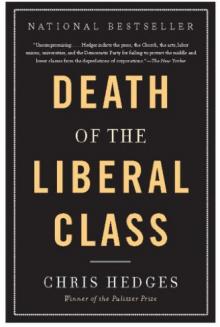Read Death of the Liberal Class Storyline:
The liberal class plays a vital role in a democracy. It gives moral legitimacy to the state. It makes limited forms of dissent and incremental change possible. The liberal class posits itself as the conscience of the nation. It permits us, through its appeal to public virtues and the public good, to define ourselves as a good and noble people. Most importantly, on behalf of the power elite the liberal class serves as bulwarks against radical movements by offering a safety valve for popular frustrations and discontentment by discrediting those who talk of profound structural change. Once this class loses its social and political role then the delicate fabric of a democracy breaks down and the liberal class, along with the values it espouses, becomes an object of ridicule and hatred. The door that has been opened to proto-fascists has been opened by a bankrupt liberalismThe Death of the Liberal Class examines the failure of the liberal class to confront the rise of the corporate state and the consequences of a liberalism that has become profoundly bankrupted. Hedges argues there are five pillars of the liberal establishment – the press, liberal religious institutions, labor unions, universities and the Democratic Party— and that each of these institutions, more concerned with status and privilege than justice and progress, sold out the constituents they represented. In doing so, the liberal class has become irrelevant to society at large and ultimately the corporate power elite they once served.From Publishers WeeklyStarred Review. In this tsunami of terrifying revelations, juxtaposed truths, and demonstrated facts, Hedges (War is a Force That Gives Us Meaning) argues that the traditional beacons of the liberal class—the universities, media, church, labor unions, and arts–have sacrificed themselves completely to the dominance of corporate greed and unbounded capitalism. We are all to blame and everything moral about our democracy stands to be lost—is indeed already vanishing, in Hedges's view—and those who draw attention to it are banished and booed. While every page erupts with calamities of the human spirit worthy of their own irate broadcasts and bull-horned fury, Hedges is at his best when he unpacks the density of his polemic and embraces the power of his narrative. Regardless of form, however, his most interesting theses include the parallel between the current domestic climate and the fall of Weimar Germany and the conclusion that "Everything formed by violence is senseless and useless. It exists without a future. It leaves behind nothing but death, grief, and destruction." These insights come not just as warning, but as witness. (Nov.) (c) Copyright PWxyz, LLC. All rights reserved. From BooklistThe real danger to progressive social ideals is not President Obama’s failure to push through a more liberal agenda or the threat presented by the Tea Party and others pushing the Republicans more to the Right. Hedges argues that the true threat to liberalism is the long and gradual weakening of its ideals. Drawing on analysis and interviews from his long career as a journalist, including 15 years with the New York Times, Hedges chronicles the corruption of such bastions of liberalism as the Democratic Party, academia, and labor unions. He cites the NAFTA agreement and welfare reform during the Clinton administration and union coziness with corporations as recent examples of the merging of government and corporate interests to the detriment of the interests of the poor or even the middle class. He also reviews the long history of assassination and co-optation of radical voices in the U.S. and the singular career of Ralph Nader as a consistent voice against capitalist excess. This is a thoughtful analysis of why and how liberals have compromised principles due to the allure of power and wealth. --Vanessa BushPages of Death of the Liberal Class :
